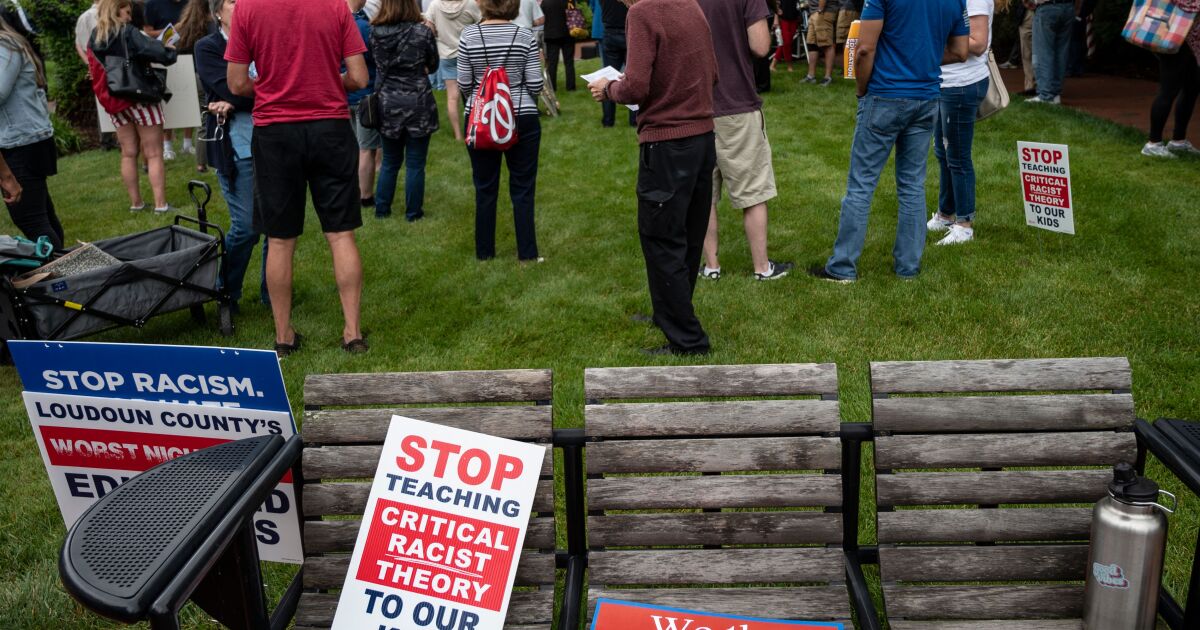

Grassroots parent activism, driven by outrage at school closures, critical race theory
, and transgender ideology, has seen widespread growth nationwide almost two years after the movement first found its legs.
The vast majority of local parent groups have established themselves with little to no outside help, often via Facebook groups formed out of anger that local school districts did not have plans to offer in-person classes to students in the fall of 2020.
“The grassroots enthusiasm we’ve seen over the past 18 months from parents has been truly astonishing — the last time I can remember anything like this forming was during the Tea Party,” Nicole Neily, the president of the national organization Parents Defending Education, told the Washington Examiner. “From coast to coast, disenchanted parents have found each other and coalesced around a few simple, discrete ideas: Parents should be involved in their children’s education.”
Neily’s organization is one of several national groups that exist to help support local parent activist organizations in logistical and practical needs, ranging from how to petition a school board to how to organize with other local parents.
JUDGE ORDERS SCHOOL DISTRICT TO ALLOW TRANSGENDER STUDENT TO USE BOYS’ BATHROOM
On its website
, Parents Defending Education counts well over 200 independent local parent activism groups, some with thousands of members, in school districts across the country and in all 50 states. The organization also regularly adds new groups to its site as more groups, often motivated by the publicity surrounding existing groups, are formed. Another parent activist organization, Moms for Liberty, has 201 affiliated chapters of parent activists in 37 states, including 36 that were established in 2022 alone.
“Without a doubt, parents have recognized that there is strength in numbers — and courage is contagious! We’ve heard many stories where a local activist speaks up and then is contacted by dozens of people in their community who hold similar views,” Neily said.
“People often assume they’re the only disenchanted person in the district, and it’s a major source of comfort for people to realize they’re not alone,” she continued. “It’s interesting that the current frustration with education transcends political and racial lines — so there are many unusual bedfellows who find themselves working together toward a common goal.”
That common goal is what led Ben Orr, a parent from Fishers, Indiana, to join Fishers One, a local parent activist group that has organized several thousand parents from Hamilton Southeastern School District.
The group started in the summer and fall of 2020, as the school district was the last in Hamilton County to return to in-person instruction, Orr told the Washington Examiner.
“We were the last ones to return completely to in-person learning, we were the last ones to make masks optional,” Orr said. “So we’ve kind of been at the tail end of all these things, and in that same time, we’ve dropped in the rankings academically.”
Orr said he and his wife both grew up elsewhere in Indiana but chose to move to Hamilton because of the reputation of the school district.
“It was known throughout the state as the best public school system, the best academics, the greatest facilities. If you drive by the school, and it’s beautiful, it looks like a college campus. They have great athletic teams,” Orr said. “And since then, it’s just been this kind of slow decline. Academically, you know, even culturally, there’s been more discipline issues. All those kinds of things have just gone down overall, over not just the last two or three years but probably five or six years.”
The district’s failures helped motivate Orr and others to push back against the district’s officials. And last month, Orr announced he would be running for a seat on the Hamilton Southeastern School Board.
“I’m basically running for school board because no one else is,” Orr said. “I think I represent a lot of our community’s values here, but people are just simply unwilling and unable to step up, speak publicly, and put a name and a face behind what they want to do.”
But the independent groups tracked by Parents Defending Education, like Fishers One, do not encapsulate the full extent of the explosion of local parent activism.
National nonprofit organization Moms for Liberty embraced a chapter-based model that has seen the organization establish 201 chapters of affiliated activist groups in 37 states. And more chapters are continually being founded in school districts nationwide.
“Our moms know … that the public education system in the United States of America is failing our kids,” Moms for Liberty co-founder Tiffany Justice told the Washington Examiner. “The people that have been in power … are not willing to own that harm.”
“Parents are done with the nonsense, we know that our kids are not doing well,” Justice said, comparing the growth of parent activism to a parent putting a helmet on their child’s head when they are learning to ride a bike.
The Moms for Liberty co-founder said parents have forced school districts to produce district records or classroom materials through Freedom of Information Act requests, drawn media attention through viral school board speeches, provided a support group for local parents, and even inspired new school board candidates.
“We celebrate wins,” Justice said. “[But] wins look really different from place to place, or sometimes even within your own district.”
“You might have a win where you were able to get one worksheet from one elementary school taken out that was talking about pronouns and gender — that’s a huge win for those parents,” she went on. “Or you might have somebody that won vice chair of their county supervisor’s office, or now they’re on the school board.”
For Justice, the rise of parent groups could in part be traced back to parent perceptions that their local parent teacher association was failing to represent the interests of parents and had instead proven subservient to the whims of teachers unions.
“As far as I’m concerned, [the PTA is] just an extension of the teachers union,” Justice said. “And we’ve seen the PTA fight against commonsense parental rights legislation and fight against parents.”
Neily said liberal activism by the national and state PTA organizations created a “gap in the market,” because “if they were truly doing a good job, then there wouldn’t be such widespread organic activism taking place.”
“The National PTA, as well as their state chapters, now regularly advocate for the same kinds of polarizing policies as other national associations do rather than addressing average families’ concerns like keeping schools open, addressing proficiency rates, and remediating learning loss,” Neily said. “It’s little wonder parents are now stepping into the arena, as these associations have demonstrated they’re fully captured political entities who place power over the welfare of children.”
CLICK HERE TO READ MORE FROM THE WASHINGTON EXAMINER
And while the PTA’s failures may have contributed to the growth of grassroots parent activism, the growth of the movement almost two years after schools first announced their reopening plans in the summer of 2020 has continued. And, according to Orr, the goal is simple.
“The main focus is to restore academic focus, increase transparency, encourage parental involvement in the community and in the school system,” he said. “Focus on the academics, don’t go off into these other areas, and be transparent about what you’re doing.”






